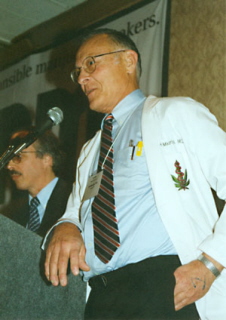Medical marijuana group moves to hasten outcome in federal lawsuit
For immediate release: May 24, 2007
Contact: ASA Legal Campaign Director Kris Hermes at 510-251-1856 x307 or
ASA Chief Counsel Joe Elford at 415-573-7842
Medical marijuana group moves to hasten outcome in federal lawsuit
Patients file motion for summary judgment today to correct government misinformation
San Francisco, CA â A national medical marijuana patientsâ rights group filed a motion for summary judgment today in its lawsuit against the federal government in an attempt to accelerate a decision in the case. The plaintiff, Americans for Safe Access (ASA), filed a lawsuit in February 2007 challenging statements by the federal Department of Health and Human Services (HHS) and the Food and Drug Administration (FDA) that marijuana has no accepted medical value. The lawsuit followed a two-year administrative petition process using a little-known law called the Data Quality Act (DQA), which allows parties to challenge the science used in regulatory policy.
By filing the motion for summary judgment, ASA will force the case to be heard in roughly 90 days. This rare legal move, where judgment is requested from the court before the government has a chance to answer the lawsuit complaint, indicates confidence in the amount of scientific evidence demonstrating marijuanaâs medical efficacy. âWe are taking an aggressive legal approach for two reasons,â said ASA Chief Counsel Joe Elford. âNot only do we believe we have science on our side, but by quickening the pace with which the federal government recognizes that science,, seriously ill persons who might benefit from medical marijuana will no longer be discouraged from using it.â
The exhibits filed in support of the motion for summary judgment include more than a dozen domestic and international peer-reviewed scientific studies that show the effectiveness of marijuana in treating pain, nausea, muscle spasticity, and many other conditions. The evidence provided by ASA is meant to refute claims by the federal government that âthere have been no studies that have scientifically assessed the efficacy of marijuana for any medical condition.â (66 Fed.Reg. 20038, 20052; April 18, 2001.) In addition to the overwhelming evidence, a lack of disputed facts will also help to secure a speedy decision by the court.
The plaintiffâs case was affirmed by a recent editorial in Science Magazine, a publication of the American Association for the Advancement of Science, which posited that HHS had âviolated its own DQA guidelines.â The Science editorial followed a February publication by the peer-reviewed journal Neurology of a human trials study in the U.S. clearly showing that marijuana relieved neuropathic pain in people living with HIV/AIDS.
If successful, ASAâs case will be the first in which a court has recognized the necessity of reviewing disputes filed under the DQA. Two other courts have already denied review in lawsuits filed under the Act by large corporations.
Review the Motion for Summary Judgment at http://www.safeaccessnow.org/downloads/DQA_Summary_Judgment_Motion.pdf.
Review info on the Data Quality Act and ASAâs lawsuit against the federal government at http://www.safeaccessnow.org/article.php?list=type&type=160.
# # #
With over 30,000 active members in more than 40 states, Americans for Safe Access (ASA) is the largest national member-based organization of patients, medical professionals, scientists and concerned citizens promoting safe and legal access to cannabis for therapeutic use and research. ASA works to overcome political and legal barriers by creating policies that improve access to medical cannabis for patients and researchers through legislation, education, litigation, grassroots actions, advocacy and services for patients and the caregivers.
 Tod Mikuriya addressing a NORML conference
Tod Mikuriya addressing a NORML conference